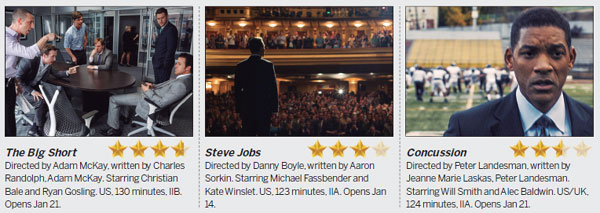The Ugly Truth
Updated: 2016-01-15 08:10
By Elizabeth Kerr(HK Edition)
|
|||||||
Sitting somewhere between the mad genius and the whistleblower is the iconoclast, the lone voice in the wilderness challenging our collective beliefs. Sometimes they're heroic, other times they change the way we live. Put an iconoclast at the center of a story about corporate malfeasance and you have a movie sub-genre that's been gaining traction since the economy crashed in 2008. Not since the Soviets has cinema had such a vile Big Bad to play with.
Awards season ensures there's a film at the multiplex to infuriate everyone. Just in time for the playoffs, Will Smith stars as Dr. Bennet Omalu, the Nigerian-born Pennsylvania pathologist who made a medical connection between professional football and degenerative neurological disease (CTE) in Concussion-and demanded the NFL acknowledge it. In Steve Jobs, what made the visionary, mean-spirited, condescending control freak Apple founder and two-time CEO (Michael Fassbender) tick is explored at three of the be-turtlenecked one's most crucial product launches. And in The Big Short, the culture of greed that led to the 2008 housing meltdown is put on the hot seat when maverick hedge fund manager Michael Burry (Christian Bale) tells Wall Street the mortgage industry is a ticking time bomb, starting a cascade of fund swapping that ultimately puts millions on the street, crashes the world economy, nets him $3 billion-and exposes the rot at the heart of the banking industry.
Concussion and The Big Short pit their iconoclasts against a monolithic corporate machine indifferent to morality and human suffering, while Steve Jobs is simply about what kind of person it takes to build one of those monoliths.
The weak link here is Peter Landesman's Concussion, which when compared to the other two is a pedestrian recreation of one man's crusade with none of the shading needed to give it any real weight. Sony Pictures allegedly softened many of co-writers' Jeanne Marie Laskas' (who wrote GQ's "Game Brain," which the film is based on) and Landesman's harsher dialogue for fear of retribution from the almighty NFL and it shows in the lack of fury Concussion inspires. If anything, the film is as much about Omalu's unshakeable faith in the greatness of the American system as it is about a lucrative business that, like Big Tobacco, knowingly put its workers at risk and then put some of its billions into smearing those who said so. Fortunately it has a muted and nuanced performance by Smith to anchor it, with great cynical support from Albert Brooks as the county coroner who warns Omalu that, "The NFL owns a day of the week - the same one the church used to own."
Better is writer Aaron Sorkin's (The Social Network) adaptation of Walter Isaacson's exhaustive biography into three 30-minute chunks from Jobs' life. The walk-and-talk nature of Steve Jobs is undeniably Sorkin, but the pace works perfectly for director Danny Boyle's chronicle of the man's development and cult of personality, moving at the speed of tech. Was Jobs flawed? Yes. Was he a genius? Probably not, but he had Steve Wozniak (Seth Rogen) for that. In the end, Jobs has been neither vilified nor vindicated, but it's clear the proprietary, holier-than-though Apple was his baby. Chances you'll want to take a hammer to your iPhone when you get home are high.
However, The Big Short engages the way the dour but excellent Margin Call and academic documentary Inside Job do not: by being absolutely hilarious. Director Adam McKay, best known for lowest common denominator comedies like Anchorman and The Other Guys, initially flirts dangerously with hyper-stylization-fourth wall breaking, diagrams, Anthony Bourdain explaining CDOs - but after the initial structural shock the film settles into a rhythm that makes the big points without ever getting out a mallet, and keeps the absurd comedy robust. Based on Moneyball writer Michael Lewis' non-fiction bestseller, Short is blessed with a stellar cast, particularly Ryan Gosling as an arrogant Deutsche Bank manager (the restroom scene is hysterical) who uses Burry's research to play both sides of the disaster to the tune of $47 million, and co-producer Brad Pitt as the only vaguely moral character in the story - or what passes for morality on Wall Street.

(HK Edition 01/15/2016 page11)